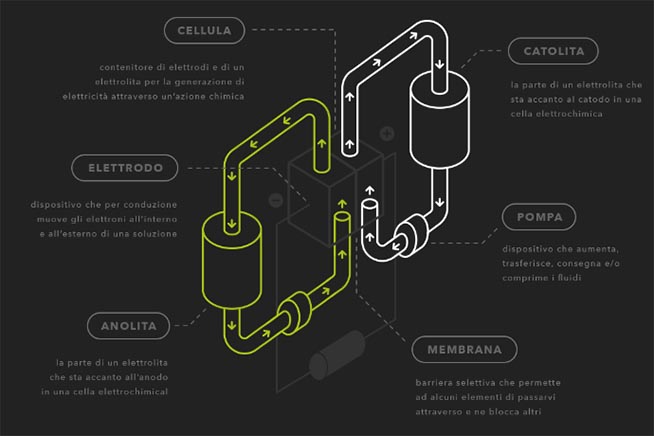Green Energy Storage has created an organic flow battery that uses the molecules of certain vegetables to produce low-cost renewable energy
If you're not a big fan of vegetables, rhubarb might make you reconsider. Not at the table, but on your electric bill. Green Energy Storage, an Italian startup, in fact, has presented an organic flow battery for the storage of renewable energy that exploits the molecules of rhubarb.
The innovative technology behind the solution developed by Green Energy Storage specifically exploits a molecule produced by plants during photosynthesis - called quinone - easily extractable from rhubarb and other vegetables, biocompatible and low cost. Designed for energy efficiency and savings in homes, commercial buildings and businesses. The patent was acquired by Harward University back in October 2015. At the time it was only a prototype able to develop 1 Watt of energy, today thanks to an Italian-American team of excellence it exceeds 10 kW.
What future scenarios for the rhubarb battery
To get to generate such a higher power than at the beginning the startup relied on several leading researchers. From Harvard University, Professors Michael J. Aziz and Roy G. Gordon collaborated, while from the University of Tor Vergata in Rome, Professor Silvia Licoccia and the Bruno Kessler Foundation. What will be the future for this type of energy saving systems? Organic flow batteries are part of a market characterized by exponential growth that will continue in the coming years. L’obiettivo di Green Energy Storage è introdurre sul mercato, entro il 2018, diverse tipologie di batterie a flusso organiche diventando un punto di riferimento per le reti elettriche del futuro non solo in Italia, ma a livello mondiale.
 Fonte foto: Green Energy Storage
Fonte foto: Green Energy Storage
Schema di funzionamento della batteria di flusso al rabarbaro
La collaborazione con Sorgenia
Per inserirsi al più presto nel contesto della distribuzione di energia a livello nazionale la startup ha intrapreso una collaborazione con Sorgenia. A partnership strongly desired by both parties, as underlined by the words of Gianfilippo Mancini, CEO of Sorgenia: "The development of economic and environmentally friendly solutions for energy storage will allow consumers to store their own renewable self-production and, thanks to advanced software for dispatching and control of their consumption, to become independent from the electricity grid. The project has already received the first funding: two million euros from the European Community and three million euros from the Autonomous Province of Trento. The medium-long term objective is set by Salvatore Pinto, president of Green Energy Storage: "Our ambitious company growth path aims at the development of an organic flow battery of 200 dollars per kilowatt hour within the next four years".
(opening video taken from Facebook)
Some of the videos in this section have been taken from the internet, so they have been assessed as being in the public domain. If the subjects present in these videos or the authors had something against the publication, just make a request for removal by sending an email to: [email protected]. We will provide to the cancellation of the video in the shortest time possible.
